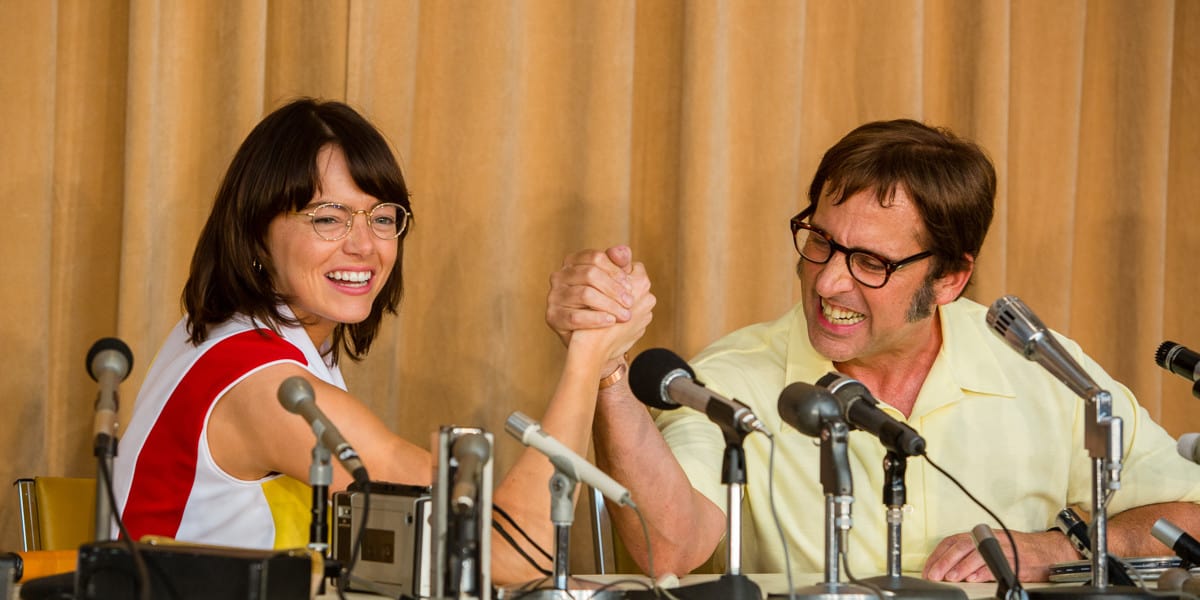Battle of the Sexes is an important movie. There is no other way to put it. Based on the true story of how Billie Jean King beat misogynist Bobby Riggs at his own game (tennis) in 1973, it is a pivotal feminist tale I feel privileged to have seen at TIFF.
As the story was originally told, King, a 29-year-old heterosexual wife and dutiful daughter, beat proud male chauvinist Bobby Riggs in a tennis match watched by millions. The game was not a friendly one; King was fighting for all women with every serve. Famous for his sexism, Riggs posited that, even though he was well into his fifties, no female tennis player could defeat him. After publicly destroying Margaret Court on the court (she was the Maria Sharapova of her day), Bobby was intent on humiliating yet another woman. He issued a challenge to our girl Billie Jean; it was up to her to defeat Riggs’ belief in female inferiority. And that she did.
Directed by Valerie Faris and Jonathan Dayton, Battle of the Sexes makes its audience feel the weight of history that rested on King’s shoulders. In a tour de force performance, Emma Stone deftly portrays the person behind the tennis legend, the Billie Jean King who had to hide her sexuality, and who was underpaid and belittled by male tennis players at every turn. In every expression, Stone somehow conveys multitudes. It is a performance that allows King, the feminist icon, to be seen as an actual human being.
At the time she defeated Riggs (played by Steve Carell) on national television, King was already an outspoken advocate for equal pay. She was a very public crusader for the women’s movement, but privately, that same movement had let her down; what few people knew at the time was that King was a closeted lesbian. While the 2001 TV movie When Billie Beat Bobby straightwashed King, Faris and Dayton embrace her lesbian identity. The film takes pains to illustrate the toll hiding her sexuality took on one of the greatest athletes of all time. It captures the bitter-sweetness of both her marriage to Larry King and her secret love affair with hairdresser Marilyn Barnett.
Feminists like Betty Friedan famously marginalized lesbian women from mainstream feminist activism in the 1960s and 70s, dubbing them “The Lavender Menace.” In the face of the intersecting oppressions of homophobia and misogyny, King still managed to be both a champion of tennis and a champion for feminism. No wonder she is admired to this day!
In the end, Battle of the Sexes will make you laugh, it will make you cry, and it will make you cheer – perhaps all at the same time. Just as millions of little girls were inspired by King’s victory when she defeated Riggs in 1973, I have hopes this film will inspire today’s young women to not give up on the feminist cause.
Over the last year, the fight for women’s equality has been dealt several blows. In an election that often felt similar to the legendary King/Riggs tennis match, Hillary Clinton tragically did not follow in King’s victorious footsteps; she lost the presidential election to an under-qualified misogynist who reminds me of a modern-day Bobby Riggs. And perhaps that is why Billie Jean King’s story matters more than ever.
No, King’s win over Riggs did not end sexism. Reproductive rights are still under threat, cisgender white men still earn more than everyone else for the same work, and who knows when the US will see its first woman president? But Battle of The Sexes reminded me of a powerful truth: King lost a game to Riggs before she won the famed 1973 match. Yes, even feminist heroines like King occasionally falter, but that doesn’t mean feminism won’t win in the end…



 Follow Us On Instagram
Follow Us On Instagram
